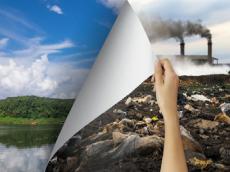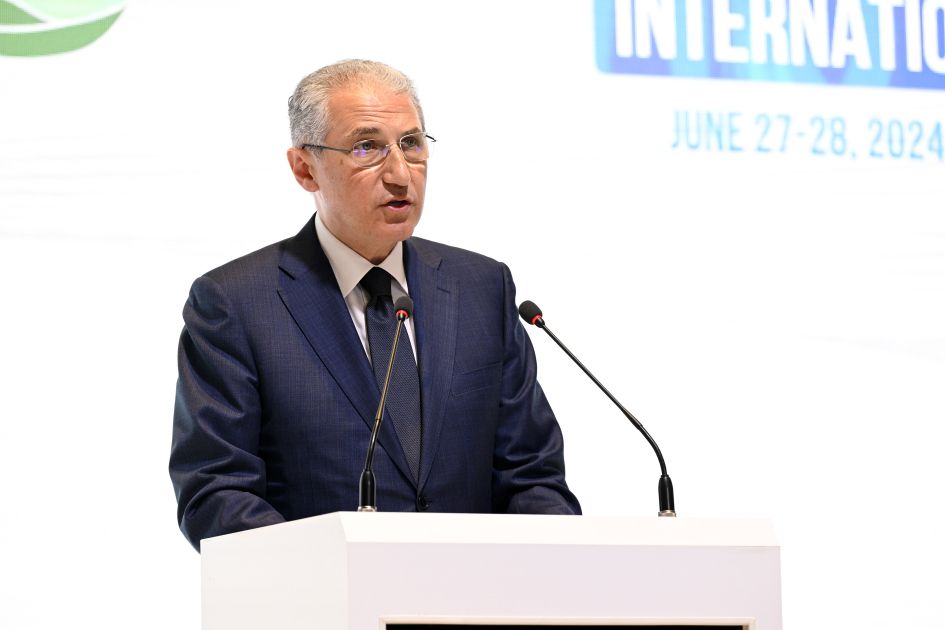|
|
TODAY.AZ / Business
Azerbaijan advances on modern waste management & ecological restoration in liberated territories
28 June 2024 [08:30] - TODAY.AZ

During the occupation period, Garabagh's ecological balance was severely disrupted. Deforestation, forest fires, water contamination, and the destruction of flora and fauna, alongside extensive land exploitation, led to significant ecological imbalance in the region.
Moreover, the widespread destruction of buildings and infrastructure resulted in substantial amounts of construction and demolition waste. Currently, managing these wastes presents challenges to ongoing construction-restoration efforts in the region.
Beyond the economic implications of waste management, industrial, agricultural, and household waste, as well as the exploitation of natural resources contribute to several ecological problems. Addressing these issues requires modern waste management practices and emphasizes the necessity of reusing these materials.
On June 27, at the International Forum titled "Green World Solidarity: Waste to Value for a Sustainable Future," part of COP29, Azerbaijan's Minister of Ecology and Natural Resources and President of COP29, Mukhtar Babayev, highlighted the establishment of modern infrastructure for waste collection, sorting, and recycling in Garabagh as a primary priority.

The Minister emphasized the significant responsibility of industrial facilities in proper waste management: "The Extended Producer Responsibility (EPR) concept covers the producer's responsibility throughout the product's entire lifecycle, from design and manufacturing to use and waste management. Azerbaijan is enhancing its legislative framework to implement this approach effectively."
M. Babayev noted that active efforts are underway to establish a modern waste management system in the liberated territories: "This is crucial for the reconstruction process. A Regional Strategy has been developed to address waste collection, sorting, and recycling infrastructure in Garabagh," stressed the Minister.
He pointed out that during the occupation, the widespread destruction of buildings resulted in numerous construction and demolition wastes that required modern management. Additionally, due to intensive restoration and reconstruction efforts in liberated areas, increasing private sector involvement is essential, he added.
"The modern management and reuse of these wastes as raw materials are crucial. Pilot projects are underway in planned settlements for restoration in the Aghdam district. We particularly appreciate the support of UNEP in initiating these efforts."
It should be noted that under the auspices of Azerbaijan's Ministry of Ecology and Natural Resources, a UN Environment Programme (UNEP) assessment mission in 2022 evaluated environmental damage in liberated areas. Laboratory tests on construction and demolition waste samples from Shusha city and Aghdam district confirmed the viability of recycling these wastes for construction use.

During the COP29 briefing, UN Deputy Secretary-General and UNEP Executive Director Inger Andersen assured that UNEP would support Azerbaijan in waste recycling and reuse efforts.
"Andersen announced that Azerbaijan has been selected to host World Environment Day in 2026, underscoring the country's exceptional beauty and commitment to climate leadership."
"I have witnessed Azerbaijan's leadership in climate issues firsthand. Today, besides visiting Shirvan National Park, I also had the opportunity to engage with a facility involved in extraordinary work, including sturgeon fish release. Azerbaijan is prepared to host COP29 and lead globally. As the United Nations Environment Programme, we are committed to supporting this beautiful country," said Andersen.
Andersen emphasized Azerbaijan's efforts in biodiversity conservation.
"Our collaborative efforts across all fronts are set to continue successfully. The situation concerning the drying of the Caspian Sea is critical. While projects are in place to address this, significant work remains."
During her speech at the International Forum, UN Resident Coordinator for Azerbaijan Vladanka Andreeva highlighted that current technologies enable the reuse of all wastes.
"The Azerbaijani government faces significant responsibilities. Collaboration with the UN in waste management continues. Our recommendations and proposals will facilitate Azerbaijan's transition to advanced waste management practices."
Andreeva concluded by emphasizing everyone's responsibility in this regard.
Active efforts are ongoing to establish a modern waste management system in liberated territories. This is integral to the reconstruction process. Azerbaijan's future economic development will be closely tied to ecological clean technologies, clean energy utilization, waste recycling, and contaminated land restoration.
As part of these efforts, household waste facilities will be constructed in Khocavand, Aghdam, Fuzuli, Kalbajar, Lachin, Gubadly, Jabrayil, and Tartar regions for waste sorting. In total, plans include constructing 7 waste facilities and 2 transfer stations. The Aghdam facility will cover 15 hectares, while those in Shusha, Lachin, and Kalbajar will each cover 10 hectares, and those in Gubadly, Jabrayil, Tartar, and Fuzuli will each cover 5 hectares. In Zangilan, a transfer station covering 10 hectares is planned.
These facilities will prepare waste for reuse and recycling. Recycling plants in liberated regions will also stimulate the local economy. Initial experience in establishing a waste management system in Garabagh has been positive. Following set goals, construction and demolition wastes generated during restoration and reconstruction in Kengerli and Horovlu villages in Aghdam and Jabrayil districts are being recycled.
This significantly reduces the environmental impact and minimizes pollution, providing materials suitable for construction. These materials are effectively utilized in roadworks, concrete works, and sub-base construction during building projects.
A utilization facility has been established in villages for construction and demolition wastes, where damaged materials are recycled into usable materials. These materials are used in roadworks and sub-base construction, achieving zero waste through this mechanism. This approach aims to achieve zero waste across all of Garabagh and Eastern Zangazur.
It should be noted that dumping, storage, and burning of wastes in unspecified locations will be prohibited. Burning industrial and household wastes harmful to the atmosphere will not be permitted without proper facilities.
Moreover, besides recycling and using wastes as raw materials, waste incineration can also generate electricity. Additionally, artistic creations can be made from these materials.
URL: http://www.today.az/news/business/250018.html
 Print version
Print version
Connect with us. Get latest news and updates.
See Also
- 29 November 2024 [18:26]
CIS countries confirm priorities for industrial collaboration and labor market development - 29 November 2024 [17:32]
Discussion held on future cooperation with employers in providing employment in liberated areas - 29 November 2024 [13:23]
AZPROMO explores cooperation opportunities with Kars Chamber of Commerce and Industry - 29 November 2024 [11:28]
Coordinating Council established for electricity market holds meeting - 28 November 2024 [18:42]
Azercell organizes training for journalists on subject of innovations and trends in media technologies - 28 November 2024 [17:18]
OPEC+ ministerial meeting rescheduled for December 5 - 28 November 2024 [16:43]
COP29 NGO Coalition acclaims Azerbaijan’s climate achievements - 28 November 2024 [15:14]
Community expresses concern over Polish President's visit to Azerbaijani-Armenian border - 28 November 2024 [13:21]
Azerbaijan adjusts working and holiday schedule for year-end 2024 - 28 November 2024 [13:00]
Construction of Sugovushan-Sarsang reservoir-Gozlukorpu-Kalbajar highway continues
Most Popular
 "European Games" around the Caucasus: Armenia prepares for war
"European Games" around the Caucasus: Armenia prepares for war
 Baku-Paris political rifts deepen at COP29 over Macron's colonial allegations
Baku-Paris political rifts deepen at COP29 over Macron's colonial allegations
 Polish diplomat summoned over President Duda's visit to Armenian-Azerbaijani border region
Polish diplomat summoned over President Duda's visit to Armenian-Azerbaijani border region
 Azerbaijan, Japan discuss strengthening bilateral cooperation
Azerbaijan, Japan discuss strengthening bilateral cooperation
 Ruthless colonialism of France
Ruthless colonialism of France
 Japan, USA & Philippines to discuss joint maritime security
Japan, USA & Philippines to discuss joint maritime security
 Is Macron a Jew? Is Macron an Arab? Macron is a hypocrite!
Is Macron a Jew? Is Macron an Arab? Macron is a hypocrite!
